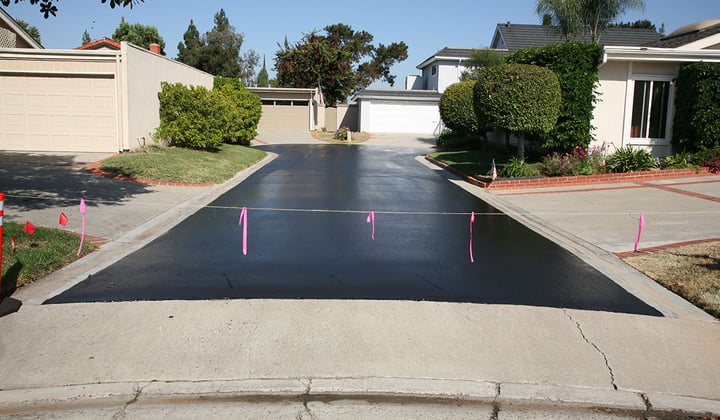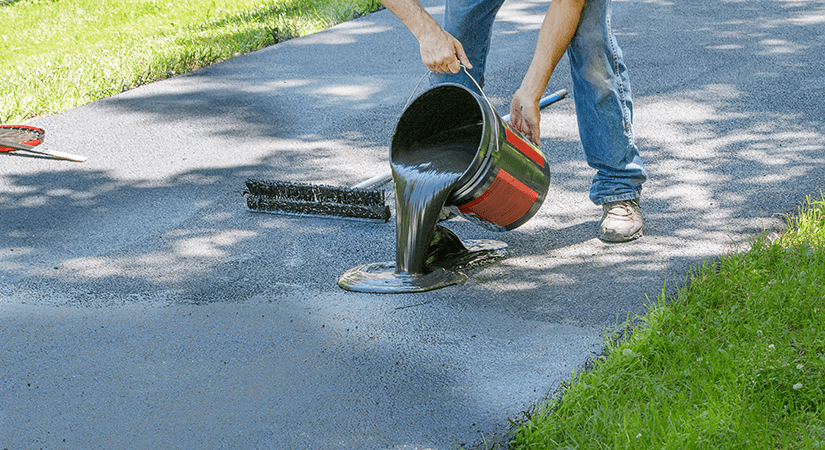Maximize Durability: Hot Mix Asphalt Sealing for Angled Parking Structures
Wiki Article
Warm Mix Asphalt: A Lasting Service for Pavement
Warm Mix Asphalt (HMA) has emerged as a leading sustainable selection for sidewalk services, providing a myriad of ecological benefits and innovative innovations. As the demand for green building and construction techniques grows, discovering the subtleties of HMA's sustainability can give valuable insights right into the future of pavement solutions.Ecological Benefits of Hot Mix Asphalt

Furthermore, Warm Mix Asphalt assists to alleviate city warmth island results. Its dark color absorbs sunlight, lowering the amount of warm mirrored back right into the ambience compared to lighter-colored sidewalks. This can reduce ambient temperature levels in city locations, reducing the demand for air conditioning and ultimately minimizing power intake.
Additionally, Hot Mix Asphalt adds to enhanced stormwater monitoring. Its permeable nature permits water to recharge and penetrate the pavement groundwater supplies, lowering drainage and the threat of flooding. These ecological benefits make Warm Mix Asphalt a sustainable choice for leading roadways and freeways.
Energy Effectiveness in HMA Manufacturing
Is energy performance an important variable in the production of Warm Mix Asphalt (HMA)? Power plays a significant duty in the manufacturing of HMA, impacting both expense and ecological sustainability. One crucial facet of power effectiveness in HMA production is the usage of cozy mix asphalt (WMA) innovations.In addition, improvements in plant innovations have actually led to more energy-efficient HMA manufacturing procedures. By optimizing energy use in HMA production, the market can reduce its carbon footprint while preserving high-quality pavement materials.
Recyclability of Hot Mix Asphalt
The recyclability of Hot Mix Asphalt (HMA) is a pivotal facet of its sustainability and long-term environmental impact. HMA is among one of the most recycled products in the USA, with over 100 million lots of reclaimed asphalt pavement (RAP) being recycled annually in new pavement construction. Recycling HMA supplies a number of environmental advantages, such as decreasing the demand for virgin products, lowering power intake throughout production, and decreasing the amount of waste sent to garbage dumps.The procedure of reusing HMA entails crushing the existing sidewalk, squashing it into smaller items, and mixing it with new aggregate and asphalt binder to create a recycled mix. In general, the recyclability of HMA plays a significant function in promoting sustainable practices within the sidewalk sector.

Long-Term Efficiency of HMA
Asphalt sidewalks demonstrate durability and strength over a prolonged period, reflecting the long-lasting performance of Hot Mix Asphalt (HMA) Furthermore, innovations in HMA innovation, such as the usage of polymer-modified binders and cozy mix asphalt, have better improved the sturdiness and durability of HMA pavements. By prioritizing high quality building and construction and maintenance practices, HMA continues to prove itself as a economical and lasting solution for lasting pavement facilities.
HMA: Durability and Sustainability
Demonstrating both durability and sustainability, Hot Mix Asphalt (HMA) has actually come to be a cornerstone in the building of lasting sidewalk facilities - commercial parking lot paving. HMA's longevity stems from its capability to withstand heavy tons, severe climate condition, and high website traffic volumes, making it a trustworthy selection for highways, highways, and go to my site airport runways. The make-up of HMA, which typically includes aggregates, binder, and filler, plays a critical role in boosting its long life and resistance to tear and use
In addition, HMA's sustainability exists in its recyclability and energy-efficient manufacturing procedure. The capability to recycle recovered asphalt sidewalk (RAP) in new HMA combinations decreases the need for virgin materials and lessens the ecological impact of pavement building and construction and upkeep. Additionally, the power efficiency of producing HMA hinges on its reduced mixing temperature levels compared to various other sidewalk materials, causing lowered energy consumption and greenhouse gas emissions.
Final Thought
To conclude, warm mix asphalt (HMA) offers a lasting solution for pavement with its eco friendly features. HMA's recyclability, energy blog efficiency in manufacturing, and long-term toughness make it an environmentally friendly option for roadway building and construction. By conserving natural deposits, minimizing waste, and lowering greenhouse gas emissions, HMA plays a critical function in advertising sustainability in framework advancement. Its capacity to alleviate metropolitan warm island results better emphasizes its value in developing resistant and environmentally conscious sidewalk systems.
HMA is one of the most recycled products in the United States, with over 100 million heaps of redeemed asphalt pavement (RAP) being recycled yearly in brand-new sidewalk construction.The procedure of recycling HMA entails grating the existing sidewalk, squashing it into smaller sized pieces, and mixing it with new accumulation and asphalt binder to create a recycled mix.Asphalt pavements demonstrate longevity and resilience over an extensive period, showing the long-term efficiency of Hot Mix Asphalt (HMA) Furthermore, innovations in HMA technology, such as the usage of polymer-modified binders and cozy mix asphalt, have better boosted the toughness and longevity of HMA sidewalks. The capacity try this out to recycle reclaimed asphalt pavement (RAP) in new HMA combinations decreases the need for virgin materials and reduces the environmental impact of pavement building and construction and maintenance.
Report this wiki page